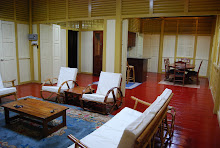It’s a Friday morning and a weekend and a continuing day in the month of Ramadan, most people in Kedah would likely be lingering snugly in their homes happily knowing that they do not have to rush to office or work. Those who normally go marketing on weekend would likely delay till later in the afternoon: a departure from the normal weekend outside Ramadan. The housewives deserved a good rest having served the household during the weekdays with all manner of dishes and concoctions, tempting the appetites for those breaking fast when the sun hits the horizon and the muezzin calls the followers to prayer.
I am dragged into slumber too. Yet in such moments, you seemed to fathom issues. Foremost I begin to seek answers to an equally simple query. What task do we performed at home? What is its scale in relation to other activities? I am inclined to believe that more contributions by male folks are due and forthcoming. Maybe I am stepping on thin ice. Six decades of living cannot be a better reason to justify this observation. Do women work more or ‘harder’ at home than men?
I am not suggesting that men have to slog and do all the house-works. The question is “What do they really do when they are at home or don’t do? Do their duties measure equally with that delivered by their other halves?
The old adage that women stayed at home and the male went to work is dead and gone. Now husbands and wives fulfilled their obligations as career persons, leave and return homes almost simultaneously. Observably the ladies of the home change into another role almost immediately upon reaching home as housewives. Husbands: they change their garbs mostly to exercise, offer their prayers or relax; waited to be served with hot cups of coffee and maybe some delicacies that were bought on the way home. Would they leave their sofas and moved into the garden, water the plants or got hold of the hose to wash the cars? Your answer is as good as mine. The wives would be fortunate if they had helpers at home otherwise they would have to turn their attentions to the children, their needs and urgencies too. A chance to turn on the TV and hear the news broadcast at six? Not likely. Even to attend to prayers would be a matter of urgency.
It is an after thought that the equal or unequal sharing of responsibilities needed a look in. We notice that the women have a greater or heavier burden of responsibilities or duties. ( who impose them in the first place?) They seemed to have abundance energy diving into the roles of motherhood and wives etc, ready to serve the needs of the family.
Where do we start to weigh these sharing responsibilities? Could it be at the primary or secondary level education? At home itself, when children learn directly from their parents? Or wait for lessons to be included in the compulsory marriage courses (right now for Muslims only)
Yet with all that endurance and iron – women reflections, the tender genders have longer or prolonged lives and able to bear the consequences for what may come in the pipelines. Or would there be resistance as already seen in other countries when marriage becomes hard to come by?
(This is a point noted during one day in the last fasting month. Possibly my point of attention was directed at one particular sector and yet I remained to be corrected if it is untrue, biased or inconcrete)











1 comment:
Pak Non,
Just discovered your blog. Discovered your daughters blog too, through the blog of anak Che Gu Halim R.
Good work. Will add your blog in my fav. Did you write about the Lebai Akil clan?
Azudin Othman Fuad
Post a Comment